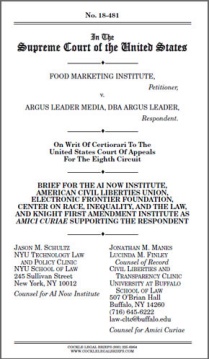
Clinic’s brief heads to U.S. Supreme Court
U.S. Supreme Court justices considering a major freedom of information case this spring will have before them a friend-of-the-court brief created by a School of Law clinic.
Students in Assistant Clinical Professor Jonathan Manes’ Civil Liberties and Transparency Clinic drafted the 41-page brief for clients including the American Civil Liberties Union, the Electronic Frontier Foundation and the AI Now Institute, a research center at New York University, as well as NYU’s Center on Race, Inequality and the Law and the Knight First Amendment Institute at Columbia University. It was filed Monday, March 25 in the case of Food Marketing Institute v. Argus Leader Media, for which the court will hear oral arguments on April 22.
“I’m excited that the clinic is able to work on behalf of organizations that are national leaders on technology, transparency, and civil liberties,” Manes says. “This has been a terrific experience for the students, being able to work with some of the smartest lawyers in the country on these issues and getting ideas and feedback.”
The case centers on a dispute over Exemption 4 in the federal Freedom of Information Act, which is intended to give citizens full information on the workings of the government. The exemption allows a federal agency to withhold from public scrutiny “trade secrets and commercial or financial information obtained from a person and privileged or confidential.”
At issue is whether companies doing business with the government can decide for themselves that certain information is confidential, or whether they must prove that releasing it would result in substantial competitive harm.
Suzanne Starr '19, John Kuebler '20, Abisha Vijayashanthar '20 and John Zakour '20 co-authored the brief.
The case centers on a request by a Sioux Falls, S.D., newspaper to see information on how much consumers using electronic benefits cards spent at various food retailers.
It’s a pretty straightforward request, Manes acknowledges, but the court’s ruling in the case could have far-reaching consequences. That’s why the clinic, in its brief, is asking the court to maintain the “competitive harm” standard and lean toward the fullest possible disclosure.
Specifically, the brief addresses issues of how the government uses technology, including artificial intelligence and decision-making algorithms, provided by private contractors. It cites examples including location tracking, risk assessment in criminal sentencing, computerized rationing of Medicaid benefits, biometric facial recognition, and automated license plate readers.
The examples were inspired, in part, by Manes’ work with UB’s Ethical AI Working Group, a collection of faculty from several UB departments who are investigating how artificial intelligence and automated decision-making systems affect values of equality, fairness, and transparency.
“The government relies extensively on the private sector to provide technology that is central to all manner of government activities – from ‘big data’ algorithmic decision-making systems, to powerful surveillance technology, to the government’s core information infrastructures. The public cannot understand core governmental activities without access to records about the private sector technologies on which they depend,” the brief argues.
Manes and four student-attorneys wrote the document, a process that involved much back-and-forth with attorneys at the client organizations. “We tried to provide a pretty diverse range of examples in order to make the point that this does affect lots of important nooks and crannies of government,” the professor says. “Our concern is that this case could have unintended consequences for the future, specifically the future of digital governance. What the grocery stores are asking the Supreme Court to do is to allow any private company that works with the government to have a veto over the public’s access to documents through FOIA.”
For one student who worked on the project, it was an eye-opening experience. “I was unaware of a lot of this technology before I worked on this brief,” says John Zakour '20. “It’s very real, but it sounds like science fiction. And if you try to just protect private businesses, you’re going to put a big shroud over this vast dystopian part of the federal government.”
From the start, he says, “we were on the phone with the party counsel. It’s really interesting. I never expected to be working on a Supreme Court brief. We were working with several organizations. They all had their comments, and these are all very good lawyers, too.
“Someone has said that bringing a case to the Supreme Court is about counting to five, and that’s always in the back of your mind, how we’re going to convince the justices. We’re excited to watch the results.”
